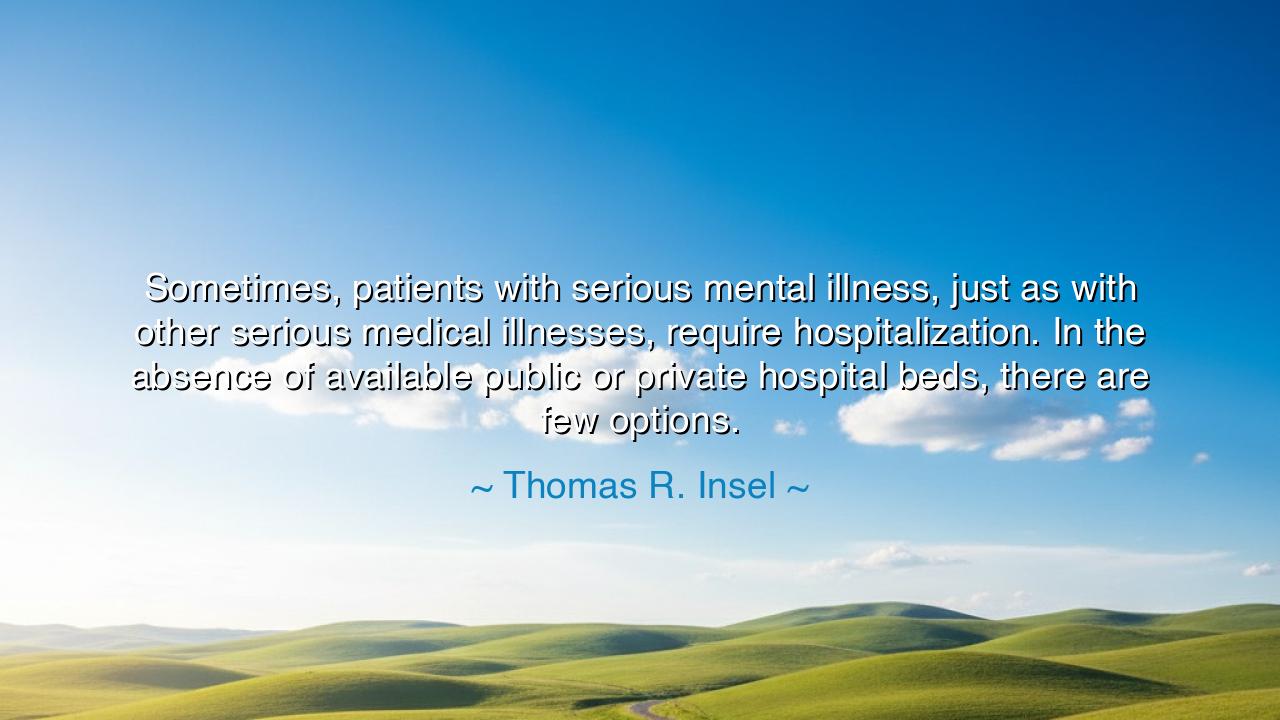
Sometimes, patients with serious mental illness, just as with
Sometimes, patients with serious mental illness, just as with other serious medical illnesses, require hospitalization. In the absence of available public or private hospital beds, there are few options.






When Thomas R. Insel declared, “Sometimes, patients with serious mental illness, just as with other serious medical illnesses, require hospitalization. In the absence of available public or private hospital beds, there are few options,” he did not speak merely as a physician, but as a witness to one of the great trials of modern civilization: the neglect of those whose suffering is invisible to the eye, yet profound in the soul. His words pierce through the indifference of society, reminding us that the wounds of the mind are as real and as urgent as the wounds of the flesh.
The meaning of his statement rests in the recognition that mental illness is not weakness of character, nor mere sadness, but a profound affliction, as grave and demanding as cancer or heart disease. Just as a broken body requires the care of doctors, nurses, and the safety of a hospital bed, so too does a broken mind require refuge, treatment, and the vigilant support of others. Insel reminds us that when society fails to provide this sanctuary, the most vulnerable are left adrift — their cries unheard, their lives at risk, their hope diminished.
The origin of this truth stretches back through history. In ancient times, those afflicted in mind were often misunderstood, cast out, or treated as cursed. Yet even then, some civilizations sought healing. The Greeks built temples of Asclepius where the sick of body and mind might rest and dream of cure. Medieval monastic orders offered shelter to those the world abandoned. The principle was clear: care must be given, for no human life is beyond dignity. Insel’s words echo this ancient wisdom, now clothed in the language of modern medicine.
History offers us both warning and inspiration. In the nineteenth century, Dorothea Dix, horrified by the treatment of the mentally ill in America, fought tirelessly to create asylums that were humane, where patients could receive care rather than punishment. Her labor gave rise to hospitals that treated the afflicted with dignity, not chains. Yet today, as Insel laments, the cycle of neglect has returned — hospital beds are scarce, resources are strained, and countless souls wander without the refuge they need. We are reminded that progress, if not guarded, can falter, and the lessons of the past must be learned again.
The lesson, then, is urgent: to honor the mentally ill as we do the physically ill, and to provide them with the same sanctuaries of healing. It is not enough to preach compassion; compassion must be built into the very structures of society — in hospitals, in clinics, in laws that guarantee treatment and dignity. Without these, words are empty, and lives are lost. Insel calls us to remember that a civilization is judged not by its wealth or power, but by the way it treats those who are most vulnerable.
Practical actions must flow from this wisdom. Support the expansion of mental health services in your communities. Advocate for more hospital beds and resources dedicated to psychiatric care. Offer kindness and understanding to those around you who struggle with unseen burdens. Recognize that just as a heart attack demands swift intervention, so too does a crisis of the mind. To ignore this is to forsake our humanity; to act upon it is to honor it.
Thus, Insel’s words endure as both testimony and warning. They remind us that the mind and body are not separate realms, but parts of the same sacred whole. To deny help to those with mental illness is to deny the very principle of medicine: to heal, to protect, to serve life. May we, as heirs of this wisdom, rise to the challenge, ensuring that no soul in need is left without refuge, and that the promise of care is extended to all — not as privilege, but as birthright.






AAdministratorAdministrator
Welcome, honored guests. Please leave a comment, we will respond soon